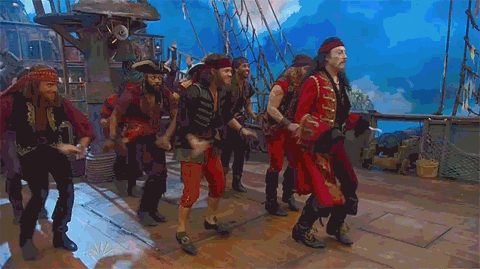With “Harry Potter and the Cursed Child” taking the world by storm, we thought that it could be fun to focus our Monday post on the stage! Though “Cursed Child” is a play that has been released as a novel, we are going to focus on the other way around: books that have been turned into successful and famous plays.
Book/Play: “The Phantom of the Opera” by Gaston Leroux (play by Andrew Lloyd Webber)
Publication/Premiere Information: September 1909; 1986
“The Phantom of the Opera” is a classic tale of beauty and the beast, obsessive and tragic love, and the power of music. The play is a personal favorite of both of us, the music and the story and the tragedy of Erik the Phantom overtaking us every time. And before you start to say “oh gross, how could you like a story about an obsessive and murderous stalker,” we have to say to you:

We know. It’s fine. Whatever. We still love it. Leroux’s novel is about Christine, an opera singer who rises to stardom thanks to lessons from her “Angel of Music.” The opera house that she sings at is also the home to an “Opera Ghost” who terrorizes those who don’t bend to his will. The Angel and the Ghost are one and the same, a disfigured man named Erik who is obsessed with Christine and wants her to marry him. But Christine is in love with Raoul, a nobleman who wants to whisk her away. This displeases Erik, and carnage and violence ensues. In spite of his creepy demeanor and stalker persona, there is just something incredibly tragic about the Phantom that makes him very, very sympathetic, and Michael Crawford’s depiction of him on the stage is a performance that is timeless. The music is very operatic and dramatic, which is perfect for a book that is basically a soap opera. “The Phantom of the Opera” has been running on Broadway since 1988, with no signs of stopping. And if you want a surefire way to make both of us sob, just play the entire finale track from the show.
Book/Play: “Les Miserables” by Victor Hugo (play by Claude Michel-Schonberg and Jean Marc Natel, English lyrics by Herbert Kretzmer)
Publication/Premiere Information: 1862; 1980
Known affectionately as “The Brick” by its fandom, the novel “Les Miserables” tackles and disseminates the French political and judicial systems of the time period. It focuses on many characters from many walks of life, but perhaps the most famous is Jean Valjean, a thief turned do gooder. Hugo’s book is considered to be one of the best of French Literature, and the play is one of the most beloved musicals of all time. The show gives many voices to many characters, especially giving voice to Eponine, a somewhat side character in the book. In the play she is arguably the second most important female role, as she is portrayed as very three dimensional and complex. The play has been translated into more than twenty languages, and has been the longest running play in London’s West End. You would be hard pressed to find someone who hasn’t at least heard of “Les Miserables,” book or play, and its enduring legacy is still going strong among classics lovers and theater kids alike.
Book/Play: “Frankenstein” by Mary Shelley (play by Nick Dear)
Publication/Premiere Info: 1818; February 2011
So this one is kind of a fun anomaly that we both wanted to talk about. The book “Frankenstein” is quite possibly one of the first examples of science fiction in literature, as a young Mary Shelley told the story of science and electricity raising the dead. This story has had MANY adaptations, from Boris Karloff as the Monster to a parody written by Mel Brooks. But this play is kind of interesting. First of all, it was directed by “28 Days Later”‘s Danny Boyle, which is pretty neat. The second, and far more relevant thing to us, is that it starred Johnny Lee Miller and Benedict Cumberbatch. Miller and Cumberbatch played both Dr. Frankenstein, and his monster, swapping roles for different performances. The play takes some licenses with the original text, but both Miller and Cumberbatch won awards for their performances as Frankenstein and The Monster.
Book/Play: “Wicked” by Gregory Maguire (play by Stephen Schwartz and Winnie Holzman)
Publication/Premiere Info: 1995; 2003
This is kind of a no-brainer for us, as “Wicked” is another of our favorite musicals. The book is more of a examination of political propaganda, social commentary, and ethics, with Elphaba Thropp, the Wicked Witch, leading a revolution and being vilified for it. The play certainly has this theme, but it gives far more play and time to the theme of friendship, specifically that between Elphaba and Glinda the Good Witch. Schwarz’s musical also makes Elphaba and Glinda more layers of complexity, as while they are complex in the novel, their complicated and fierce friendship makes both of these witches not only stronger, but more vulnerable.
Book/Play: “Peter Pan” by J.M. Barrie (musical directed by Jerome Robbins)
Publication/Premiere Information: 1911, 1954
And, of course, no list of famous book/play/musical adaptations would be complete without mentioning “Peter Pan.” Technically this is a tricky one as as Barrie originally wrote “Peter Pan” as a play that debuted in 1904 and then later adapted it into a novel. And then in 1954, it was re-adapted as the musical, lead by Mary Martin as the title character, that we are all most familiar with today. While both have challenging aspects to modern viewers/ readers, Barrie’s timeless story of childhood and the perils of growing up is one that continues to spark imagination. Sadly, that imagination does not always translate into great things…

So that’s it from us! What are some of your favorite book-to-stage adaptations?










